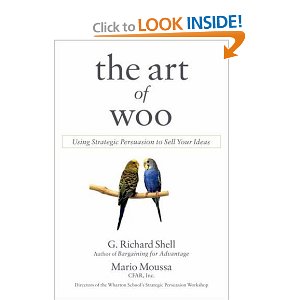 Last week I wrote an article about persuasion as a process, in which I emphasized the critical importance of preparation and positioning before you get in front of your intended audience. I’ve chosen The Art of Woo for this week’s book recommendation for the lessons it includes about strategic persuasion.
Last week I wrote an article about persuasion as a process, in which I emphasized the critical importance of preparation and positioning before you get in front of your intended audience. I’ve chosen The Art of Woo for this week’s book recommendation for the lessons it includes about strategic persuasion.
Practical Eloquence Blog
 There was a FedEx commercial where a low-ranking employee suggests opening an online account to save shipping costs. No one responds. A few seconds later, the boss says exactly the same thing, only this time using emphatic gestures. Everyone cheers and adopts the solution. When the young guy points out that he suggested the same idea, the boss says: “But you didn’t go like this”, as he karate-chops the air.
There was a FedEx commercial where a low-ranking employee suggests opening an online account to save shipping costs. No one responds. A few seconds later, the boss says exactly the same thing, only this time using emphatic gestures. Everyone cheers and adopts the solution. When the young guy points out that he suggested the same idea, the boss says: “But you didn’t go like this”, as he karate-chops the air.
That scene may be a bit exaggerated, but the fact is that many speakers unconsciously disarm themselves by imprisoning their hands while they speak. They lose the effectiveness that gestures can contribute to the effectiveness of any presentation or conversation by supplying information, authenticity, and energy.
 My Favorite Books on Presentations and Speaking
My Favorite Books on Presentations and Speaking
I’m often asked to recommend books on various topics, and as a result I’ve compiled an extensive list, which I will share in stages in upcoming posts. It’s tough to winnow down the list to a half-dozen for each topic, and I expect each list will change over time as new books are written or I get suggestions for others I haven’t read.
Advanced Presentations by Design, Andrew Abela
I put this at the top of my list of presentation books because it’s practical and it’s the best-supported by research. I especially like his method for differentiating between “boardroom” slides and “ballroom” slides.
Perfect Pitch, Jon Steele
This is an excellent book about making compelling sales presentations. Steele comes from the advertising world and has extensive real-world experience. The chapter on how London won the 2012 Olympics is worth the price of the book.
Thank You for Arguing, Jay Heinrichs
Heinrichs does a great job of making classical rhetoric relevant to our world today. You don’t have to memorize the technical names of the rhetorical devices to appreciate their effectiveness. This book is erudite, funny, and practical.
Speak Like Churchill, Stand Like Lincoln, James Humes
Humes gives 21 excellent suggestions for improving your speeches, drawing from some of the great communicators in history. An excellent book if you want to be a speaker and not just a presenter.
Jacked Up, Bill Lane
You have to put up with a bit of hero worship to get through this book, but it’s worthwhile. It gives great insight into what impresses top executives when you present to them, and should convince you to put the long hours into preparation.
Made to Stick, Chip Heath and Dan Heath
Why do urban legends persist even when they’re shown to be false? This book dissects what makes messages memorable. I will read anything the Heath brothers write, because of their very entertaining style. Plus, for a knowledge-hound like me, the Notes pages are a gold mine of additional reading suggestions.
I welcome any suggestions for titles to add to this list.
 We all admire the heroic view of persuasion, where the hero deploys his impeccable reasoning, formidable personality and eloquent words to sway an audience. Think 12 Angry Men, or Win One for the Gipper, or, for the more literary-minded, Mark Anthony’s eulogy for Caesar, where he artfully turned the anger of the mob away from Caesar and against his murderers. It’s easy to be fascinated, because that’s where the drama is.
We all admire the heroic view of persuasion, where the hero deploys his impeccable reasoning, formidable personality and eloquent words to sway an audience. Think 12 Angry Men, or Win One for the Gipper, or, for the more literary-minded, Mark Anthony’s eulogy for Caesar, where he artfully turned the anger of the mob away from Caesar and against his murderers. It’s easy to be fascinated, because that’s where the drama is.
But the most effective persuaders in the long run usually do it without the dramatics. They understand that, in the words of Sun Tzu, the best general is not the one who wins the most battles, but the one who wins without having to fight battles.


